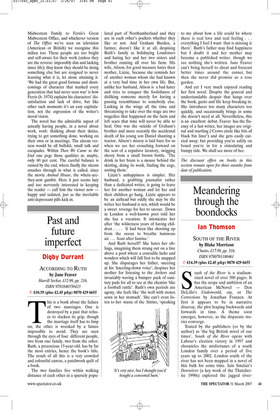Past and future imperfect
Digby Durrant
ACCORDING TO RUTH by Jane Feaver Harvill Secker, £12.99, pp. 216, ISBN 9781846550423 ✆ £10.39 (plus £2.45 p&p) 0870 429 6655 This is a book about the failure of two marriages. One is destroyed by a past that refuses to slacken its grip, though the marriage itself has to limp on; the other is wrecked by a future impossible to avoid. They are seen through the eyes of four different people, two from one family, two from the other. Ruth, a precocious 15-year-old, has by far the most entries, hence the book’s title. The result of all this is a very crowded and colourful canvas, a patchwork quilt of a book.
The two families live within walking distance of each other in a sparsely popu lated part of Northumberland and they are in each other’s pockets whether they like or not. And Graham Burden, a farmer, doesn’t like it at all, despising Ruth’s family as holidaying Londoners and hating her and her two sisters and brother running all over his farm. His wife, Alison, for good measure hates their mother, Lizzie, because she reminds her of another woman whom she had known at a very bad time in her own life. But, unlike her husband, Alison is a bad hater and tries to conquer the foolishness of disliking someone merely for having a passing resemblance to somebody else. Lurking in the wings all the time and threatening to take over the stage are two tragedies that happened on the farm and left scars that time will never be able to heal. One was the suicide of Graham’s brother and more recently the accidental death of his young son Daniel shunting a tractor. Alison’s misery is laid bare for us when we see her crouching forward on the seat of a repulsive lavatory, swigging sherry from a small brown bottle. ‘The drink in her brain is a mouse behind the skirting, doing its work, finding the cogs, sorting them.’ Lizzie’s unhappiness is simpler. Her husband, a grubbing journalist rather than a dedicated writer, is going to leave her for another woman and let her and their children go hang. Lizzie appears to be an airhead but oddly she may be the writer her husband is not, which would be a sweet revenge for her to savour. Down in London a well-known poet told her she has a vocation. It intoxicates her after ‘the wilderness years of having children . . . . It had been like shooting up from the ocean to breathe luminous air . . . feast after famine.’ And Ruth herself? She hates her siblings, imagining them strung out on a line above a pool where a crocodile lurks and wonders which will fall first to be snapped up. She disparages her father, sneering at his ‘kneeling-down voice’, despises her mother for listening to the Archers and invariably waving a bumper pack of sanitary pads for all to see at the chemist ‘like a football rattle’. Ruth’s own periods are agony, she feels like ‘the wolf with stones sewn in her stomach’. She can’t even listen to her music of the Sixties, ‘speaking to me about how a life could be where there is real love and real feeling . . . everything I feel I want that is missing is there’. Ruth’s father may find happiness but I doubt it and her mother may become a published writer, though we see nothing she’s written. Jane Feaver can’t bring herself to cheat and forecast better times around the corner, but then she never did promise us a rose garden.
And yet I very much enjoyed reading her first novel. Despite the general and understandable despair that hangs over the book, gusto and life keep breaking in. She introduces too many characters too quickly, and occasionally brings in some she doesn’t need at all. Nevertheless, this is an excellent debut. Feaver has the fluency of a fast writer, her images are original and startling (‘Crows circle like bits of black bin liner’) and she gets easily carried away; but providing you’re safely on board you’re in for a stimulating and bumpy ride. We shall see more of her.
The discount offers on books in this section remain open for three months from date of publication.










































































 Previous page
Previous page